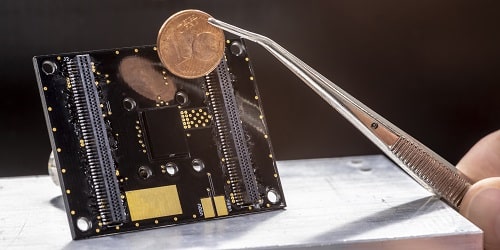Having a size less than two one-cent coins, the energy-efficient sensor can be integrated into mobile devices for real-time processing

Slightly smaller than two one-cent coins stacked on top of each other is a particle sensor developed by TU Graz, ams and Silicon Austria Labs. Compact and energy-efficient, the 12x9x3 mm innovation requires no maintenance and can be integrated into mobile devices such as smartphones, smartwatches or fitness wristbands for measuring air quality in real-time and create an alert in the event of increased fine dust levels.
The development was based on well-known methods of conventional measuring instruments as well as modern manufacturing and integration methods. “The sensor is right at the limit of what is physically and technically feasible and involves a lot of tricks to function at this (miniature) size,” said Paul Maierhofer, PhD student at the Institute of Electrical Measurement and Sensor Systems, Graz University of Technology.
Improving air quality
The immense social benefit of this new innovative particle sensor is obvious. According to a study by the European Environment Agency (EEA), over 400,000 people die prematurely every year in Europe alone as a result of particulate matter pollution. With the help of wearables equipped with the new particle sensor, every individual can monitor the ambient air and react immediately in the case of health-endangering fine dust values. “For example, by avoiding particularly polluted routes when jogging or on the daily commute to work,” says Alexander Bergmann, head of the Institute of Electrical Measurement and Sensor Systems at TU Graz and doctoral supervisor of Paul Maierhofer.
Not only in wearables, but the sensor can also be integrated into local applications – both in the home and outdoors and thus provide an unprecedented variety of measured values. “Close-meshed and comprehensive monitoring of air quality has so far failed due to the size, complexity and cost of currently available measuring sensors. Our particle sensor fills a gap here,” said Alexander Bergmann. The data obtained can serve as a basis for further regulatory measures and raise public awareness of the particulate matter problem.
Ams intends for the series production of the sensor to achieve a price that is significantly lower than the currently available sensors.
This research is anchored in the Fields of Expertise “Mobility & Production” and “Sustainable Systems“, two of five strategic focal areas of Graz University of Technology.







